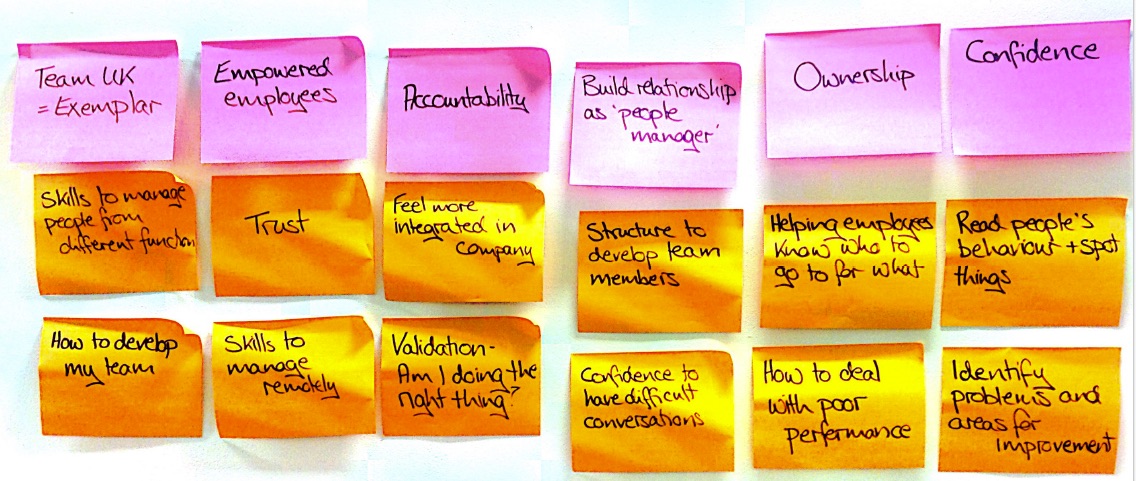A Year in the Life of a Manager Development Programme | Part Eight
Are you a bit of a perfectionist? Yes. So am I. After all, I don’t want to just do an okay job. I want to do a brilliant job. I don’t want to deliver a Manager Development Programme that is adequate. I want it to be exceptional. So imagine my disappointment to learn the Manager Development programme isn’t delivering everything I would hope for. The Manager Development Programme
The Manager Development Programme mid-point review means it’s time for some reflection and evaluation. I started this series of posts to reveal the planning that’s needed in developing a Manager Development Programme and to give you an insight into the results that are possible.
I like to interpret the word evaluation as a combination of the words ‘value’ and ‘appreciation’. This mid-point review is an opportunity to look at, identify and appreciate what value the programme has added and discover the progress made. It’s also a chance to identify any areas where there’s potential for further progress and improvement, going forward.
Looking back at the starting line
Our starting point for the mid-point review workshop was
1 A look back at what the senior executive team of the organisation wanted to achieve from the programme (the pink Post-it notes).
2 A look back at what the managers said they want to achieve from the programme (the orange Post-it notes)

We looked at the flip charts from the original co-design workshop and by doing this I could remind everyone what they had identified as their desired outcomes from the Programme. The managers had listed outcomes that included the skills to manage people from different functions, to feel more integrated into the company and to develop the confidence to have difficult conversations. The senior executives wanted managers who empowered their employees, took accountability and ownership for solving problems and had the confidence to take action.
We then looked back at the Cover Story Vision they had created that detailed the metrics they had wanted to impact through the programme. They included:
Company growth
Staff retention
Employee engagement
Internal progression of people
Positive reflections and tangible progress
Working in pairs I asked the managers to produce a poster that summarised:
Their personal progress during the Programme so far
The impact they’d had on their people
Their impact on the organisation
And, encouragingly, some really good things came out of this exercise.
On reflection, they felt they had learned the right way to manage employees. They’d developed techniques, had practical tools they could employ and felt more confident with their people, especially around having difficult conversations. Those new skills and techniques had resulted in a positive impact on their people. And that, in turn, had resulted in a positive impact on the organisation. In part.
They were retaining staff
They reported that they had happy customers
They had gained several new customers
They talked about success with up selling
And they were making more money because of everything we had done together
Identifying challenges and areas where further improvement is needed
But, what became clear was there are some challenges. And here’s where I had to give myself a bit of a reality check.
The managers felt there was a lack of communication from the senior team and they didn’t have space and time to develop. They also felt they didn’t always have the power to make decisions or take action. But the senior team clearly felt they do have the power and said they wanted the managers to take more responsibility for making decisions.
Clearly a disconnect there.
I suspect both groups are right. And they both have a responsibility to try to resolve the situation.
Next steps?
At this point, I gave myself a bit of a kick. The client is paying me to make a difference to the company, not just to make the managers feel happier at work (although that’s a brilliant effect of what we’re doing). It’s clear that progress has been made and that a lot of the Post-it notes from our first workshop have been ticked.
But there’s still work to be done. And that work must now focus not only on the managers to develop their leadership skills, but also the organisation, to instil the culture, systems and processes needed to reinforce the progress that the participants have made so far.
My next steps then are to work out how to take this fresh, new clarity up through the organisation – and to step up my presence and influence.
So, at the Manager Development Programme mid-point review, I think it’s fair to say the programme has added value and helped the managers make good progress. Through the review, we have now identified opportunities for further progress and improvement.
At the beginning of this post, I confessed to being a bit of a perfectionist. But I will also admit I don’t think it’s a helpful trait. A focus on making everything perfect can sometimes tie people up in knots and stop them taking action. It’s much more helpful to focus on the steps you can take to make progress. And so, I am going to practice what I preach and focus on progression, not perfection as we move forward to the next steps.
Do you want to see how the story ends?
You can read the full series “A Year in the Life of a Manager Development Programme.”



